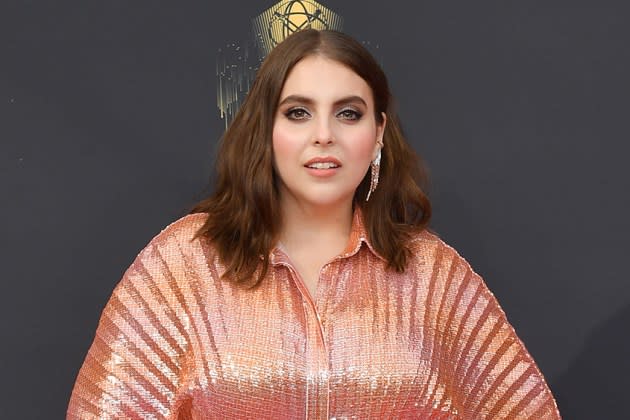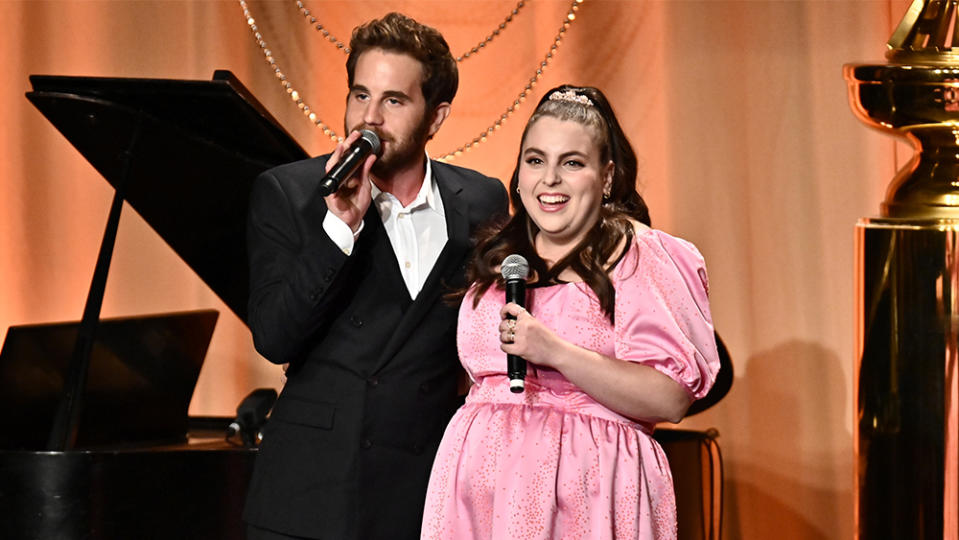Beanie Feldstein Recalls the First Time She ‘Felt Othered for Being Jewish’ (Guest Column)

I grew up in West Los Angeles, surrounded by a lot of Jewish people. My family belonged to a Reform synagogue where we would observe the high holidays and I would attend twice-weekly Jewish studies afterschool classes. Eventually, I would become a junior cantor there, duetting on the bimah with the cantor on Yom Kippur. But outside of temple, I felt just as surrounded by Jewish people: many of my teachers and classmates at my secular elementary school, the families of my best friends, strangers at the mall or the supermarket. Being Jewish felt natural, represented, full of community.
I also grew up madly in love with theater. And when I was 10 years old, I performed in my first professional theatrical production, “Annie,” at the La Mirada Theatre. The way I got there was quite funny: my best friend Shayna, with her curly red hair and golden voice, was going to the open call. My mom and I decided I would go and audition just so I could spend time with Shayna, who lived far away from us, thinking full well I wouldn’t get past the first round.
More from Variety
'The Light in the Darkness' Creator Shares How His Video Game Can Educate People About the Holocaust
Yet, like a few other professional roles I would eventually play in adulthood, my short legs and round stature’s unexpected ability to dance ended up getting me cast as Kate, the orphan who presents Miss Hannigan with a dead mouse and does a little soft shoe during the orphans’ big act two number, “You’re Never Fully Dressed Without a Smile.”
So, somehow, on April 11, 2004, I ended up behind the scrim on Annie’s bed in Miss Hannigan’s orphanage waiting for our Sunday matinee to begin. Before each performance, the producer of our show would do a curtain speech. But on this day, the speech began differently: “Happy Easter! We just want to thank you again for spending such a special day with us. For you all to celebrate Easter Sunday at the theater with us means the world. Oh! And you know what, it is not just Easter today. We also want to wish a special Happy Passover to the only Jew in our cast, our little Jewish orphan, Beanie. Beanie, will you come out here?”
What happened next, to be honest, is quite simply a blur. My mom, who was in the audience that day, says I just walked out like an absolute deer in headlights as the sound of confused applause rumbled in the audience. Then, I scurried as fast as I could back to the safety of Annie’s bed and the show began.
But there is one moment from that day that remains crystal clear to me now, even 20 years later. At intermission, the girls surrounded me in our cramped shared dressing room. One of the girls — with white-blonde hair — looked me up and down and said, “You’re Jewish? But you look just like us?”

April 11, 2004: the day I felt othered for being Jewish the first time in my life. Looking back, I recognize how deeply lucky I was to make it 10 years in the safe, protective bubble of a home where being Jewish was commonplace, understood. But there, in that theater just an hour outside of Los Angeles, as I was surrounded by 10 Christian girls looking at me desperately trying to find something wrong on me: their squinted eyes asking, “Is it her nose?,” “Is it her hair?” I felt like a sideshow act.
To be Jewish is to be 0.2% of the world’s population. To be Jewish in Los Angeles is to be 17.5% of the city’s population. All it took was my 10-year-old self leaving the city of Los Angeles by only 30 miles to feel that monumental shift. The producer was trying to be kind, inclusive… but I felt so singled out, so put on display. A short, round matzoh ball in a sea of perfect pastel bunnies.
I think of this moment when rhetoric is touted about Jewish representation in the media. To their knowledge, the other girls had never met or seen a Jewish person before. That is stark. I was the only Jew in the cast. That is stark. To be Jewish is to somehow be unseen and overseen all at once. To be under a harsh, blinding spotlight and yet erased, invisible, simultaneously. The 10-year-old girl walking out into the light to confused applause. To be Jewish is to be made to feel like you take up more space than you actually do. This dichotomy has to be acknowledged, represented and celebrated.
After the matinee, the theater put on an Easter egg scavenger hunt for all of us girls. And guess who found the largest egg with $100 inside of it? The little matzoh ball.
Beanie Feldstein is an actor and producer.
This article is part of Variety’s Antisemitism and Hollywood package and was written before October.
Best of Variety
Sign up for Variety’s Newsletter. For the latest news, follow us on Facebook, Twitter, and Instagram.


